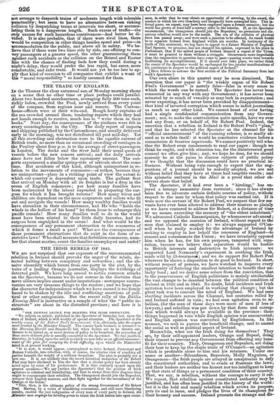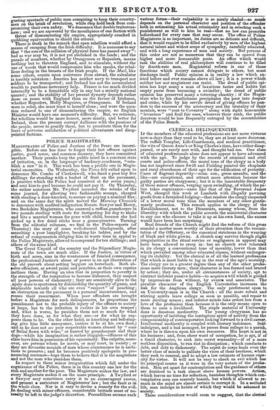THE IRISH REBELS OF 1845.
WE are not surprised that our exposure of the unconsummated rebellion in Ireland should provoke the anger of the rebels, de- tected halting between conspiracy and cowardice ; and the ab- usive absurdity which bursts from one party in the plot, by the voice of a leading Orange journalist, displays the writhings of detected guilt. We have long ceased to notice common attacks on the Spectator, because we do not concur in the doctrine that mere silence implies assent under imputations : newspaper contro- versies are very tiresome things to the readers ; and we hope that the character for independence which we have earned is too firmly based to be shaken by the idle and conflicting- assertions of poli- tical or other antagonists. But the recent sally of the Dublin Evening Mail is instructive as a sample of what the "public in- structors" are about in the disturbed province ; and here it is entire.
"THE NI.W.LST DEVICE FOR MEETING THE remit DIFFICULTY.
"We subjoin an article, published in the Spectator of Saturday last, upon the istate of Ireland, which is well worthy of special attention. The Spectator is the weekly organ of Sir Robert Peel's Government; it is, obviously, also the organ most trusted by the Minister himsey: The coarser hack business is intrusted to the Morning 'Jerald and Standard; but when feelers are to be thrown out, threats to be hinted at, or novel devices of policy to be broached, the execution of these more delicate jobs is usually committed to the Spectator. We feel justified, therefore, in looking upon the article to which we now refer as an official announce- ment of the plan for escaping the Irish difficulty, upon which the Ministerial mind is at present working. It is now, it would appear, contemplated to drive Ireland, Protestant and Roman Catholic, into rebellion, with, of course, the ulterior view of crushing all parties beneath the weight of a military despotism. The plan is probably not a new one. It is not unlikely that the secret historical researches of Sir Robert Peel may have disclosed to him the fact that a similar policy has been already acted upon by some of his predecessors. It is thus concisely opened upon the present occasion—' We say (writes the Spectator) that the position of Irish agitators is criminal and humiliating, and that to escape from their disgrace they ought to consummate their rebellion. The Orangemen should join the Repealers, conquer their English masters, and then fight together for the ascendancy of the
or the Green.'
his, then, is the ultimate policy of the strong Government of Sir Robert Pee]. Having, by a series of blundering concessions, and still more blundering insults, excited the just indignation of every man of every party in Ireland, the Minister now employs his hireling press to taunt the Irish nation into open resist-
14
ance, in order that he may obtain an opportunity of severing, by the sword, the meshes in which his own treachery and incapacity have entangled him. This in- fernal game, we repeat, may have been employed upon a former occasion; but the world has grown at least half a century older in the interim. If as the Spectator recommends, the Orangemen should join the Repealers,' no premature and dis- astrous rebellion would now be the result. The era of the collision of physical force has passed away; and were such a junction to be effected, its result would be to separate Ireland from England within six months. In testimony of the truth of this statement, we beg leave to appeal to a former Minister of England. Earl Spencer, we presume, has not changIrdeihains opinion, expressed in his place in parliament, that if the united people of d demand a repeal of the Union, it must be granted to them without a straggle. Occurrences more improbable than the conjunction in question have come to pass—passing events tend towards facilitating its accomplishment. If it should ever take place, we rather think the sneers of the Spectator would be exchanged for less jocular manifestations of his sentiments in respect to the political aspect of Ireland." [Here follows in =tens° the first section of the Political Summary from last week's Spectator.] Our own share in this quarrel may be soon dismissed. The assertion that our paper is "the weekly organ of Sir Robert Peel's Government" is merely false—false in every sense to which the words can be turned. The Spectator has never been connected in any way with any Government ; it has never been actuated by so much of venality as may lurk in expectation ; and never expecting, it has never been provoked by disappointment— that kind of inverted corruption which seems to infest journalism as much as any other kind. We cannot boast of ever having had a single confidential communication from any Govern- ment; nor, to make the contradiction quite specific, have we ever had any from, or on behalf of, Sir Robert Peel. Indeed, the assertion that a rebellion in Ireland is Sir Robert Peel's "plan," and that he has selected the Spectator as the channel for his "official announcement" of the cunning scheme, is so madly ab- surd as to refute itself: it would be conclusive evidence before a commission de lunatic° inquirendo. We cannot positively tell whe- ther Sir Robert even condescends to read our pages : though we thia he ought, and with attention too, for the disinterested good counsel we often give him ; nay, we hope he does, for we should scarcely be at the pains to discuss subjects of public policy if we thought that the discussion could have no practical in- fluences. Without being vain enough to expect that the sug- gestions of a journal should be nakedly adopted, we are net without belief that they have at times had tangible results ; and this splenetic outburst in the Mail is a proof that other ob- servers share that belief.
The Spectator, if it had ever been a "hireling," has en- joyed a strange immunity from restraint ; since it has always been free to advocate certain definite courses of policy, without respect to the men by whom that policy was carried out. If it were now the servant of Sir Robert Peel, we suspect that few ser vents have ever been allowed to address their tnasters so plainly as we have ventured to address Sir Robert, at a distance of time by no means exceeding the memory of "the oldest inhabitant" We advocated Catholic Emancipation, by whomsoever advanced ; and we opposed the coercion of Ireland, without regard to the men that claimed to employ it : we always supported O'Con- nell when he really worked for the advantage of Ireland by seeking to employ in her behalf the resources of England—to cement and consummate the Union ; we have invariably opposed him when he has, for his own purposes, tampered with sepa- ration, because we believe that separation would be hostile to British interests and destructive to Irish interests : we supported Lord Normanby's experiment in soothing the Irish, made wild by ill-treatment ; and we do support Sir Robert Peel wherever he shows a disposition to do good to Ireland. In short, without respect of persons, we have watched to improve every opportunity of fostering the smallest intention to benefit that un- lucky land ; and we derive some solace from the conviction, that to the perseverance of English politicians is mainly attributable the vast change to be descried between the political condition of Ireland in 1825 and in 1845. No doubt, Irish incidents and Irish agitation have been employed in working that change ; but the great task was to convert the mind of England. We had seen startling incidents across the Channel, but centuries rolled by and Ireland suffered in vain ; we had seen agitation even to re- bellion, (for the men of those days were more of men if less of lawyers,) and rebellion was put down by that force and corrup- tion which would always be available in the province : those things happened in vain while English opinion was unconverted; and English opinion was converted by Englishmen. In like manner, we seek to pursue the beneficial change, and to amend the social as well as political aspect of Ireland. Meanwhile, what are the Irish doing for themselves ? They are, by their self-appointed leaders, Orange and Repeal, doing their utmost to prevent any Government from effecting any bene- fit for their country. They, Orangemen and Repealers, are doing their best to keep up the staple trade of O'Connell—an agitation which is profitable alone to him and his retainers. Under one name or another—Ribandmen, Repealers, Molly Maguires, or Orangemen—the Irish people are arrayed in conspiracies to defy the constituted authorities, and to evade or frustrate the laws; and their leaders are neither too honest nor too intelligent to keep up that state of things as a permanent condition of their country. That, we say, is rebellion, without the courage to carry it out. We repeat, that rebellion against constituted authority may be justified, and has often been justified in the history of the world : but it is the bold and manly rebellion which avows its purpose, puts its end in issue, and pledges the lives of its champions for their honesty and success. Ireland presents the strange and als- gusting spectacle of public men conspiring to keep their country- men on the brink of revolution, while they hold back from com- promising their own safety. We denounce that double traitorous- ness ; and we are answered by the mouthpiece of one faction with
threat of dismembering the empire, appropriately couched in quibbling equivocation to shield the utterer. There is truth in the remark that open rebellion would afford a means of escaping from the Irish difficulty. It is nonsense to say that "the tera of the collision of physical force has passed away" : bad as war may be, it is not yet abolished in the lands ; and the parade of numbers, whether by Orangemen or Repealers, means nothing but to threaten England, and to stimulate, without the use of words that would compromise him who speaks, the rebel- lious feeling in the breasts of the Irish people. If the Mail, like some others, counts upon assistance from abroad, the calculator is terribly mistaken : America has neither navy to transport nor soldiers to be transported ; and Ireland has not the accumulated wealth to purchase mercenary help. France is too much divided internally to be a formidable ally in any but a strictly national quarrel ; and the stability of her present dynasty depends rather more on peace with England than on the favour of Irishmen, whether Repealers, Molly Maguires, or Orangemen. If Ireland were to rebel, she must trust to herself alone ; and were the ques- tion reduced to one of dismembering the empire no English Minister would have one moment's difficulty. But, we reiterate, flat rebellion would be more honest, more manly, and better for Ireland, than the present corrupt dalliance with the passions of the people, never to gratify them, but to prostitute them for the lucre or perverse satisfaction of political adventurers and disap- pointed factions.



































 Previous page
Previous page